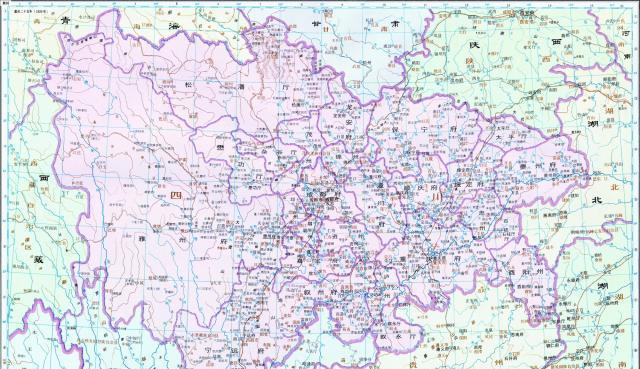We read all the lead to present a different history.
As we all know, China has a vast territory and a large population, and there are currently 34 provincial-level administrative regions, with their own characteristics in terms of area and terrain. If you want to say which province is the most important, there may be no result in a three-day and three-night struggle. However, if you add the four words "strategic position", I am afraid that the answer is very clear - in the eyes of many people, Sichuan, which is linked to hot pot, skewers and pandas, is actually the most important province of China's strategic position.

▲Map of Sichuan Province in the Qing Dynasty
In ancient times, those areas with dangerous terrain and easy to defend and difficult to attack were usually the key areas for contention between the two sides of the war, and their gains and losses would even directly affect the final outcome of the war. The Tang Dynasty poet Li Bai lamented in "Shu Dao Difficulty" that "the difficulty of Shu Dao is difficult to go to Qingtian", and it is not difficult to find from this sentence that the terrain of Sichuan is exactly what the ancient warriors valued. During the Warring States period, the State of Qin, because of its remote location and economic backwardness, was not initially taken seriously by the Central Plains countries. It was not until the military strength of the Qin state increased and it managed to annex the state of Ba and the state of Shu that it gradually embarked on the road to hegemony.
▲The Shu Road was dug up by the mountain
After the Qin state attacked the Six Kingdoms, the Qin king Yingzheng proclaimed himself the first emperor, hoping that the Great Qin Jiangshan would be passed on forever. However, after Hu Hai of Qin II ascended to the throne, heavy taxes and harsh laws made the lives of the common people miserable and the people's grievances were rife. After Chen Sheng and Wu Guang launched an uprising in Daze Township, local powerful people joined in, and eventually joined forces to overthrow Qin rule. After the fall of the Qin Dynasty, Xiang Yu supported the grandson of Emperor Huai of Chu as Emperor Yi, and later killed him to establish himself as the overlord of Western Chu. After the "Feast of Hongmen", Xiang Yu made Liu Bang the King of Han and made him rule over bashu and the area around Hanzhong.
▲ Han Gao Zu Liu Bang stills
In fact, Liu Bang should be grateful for Xiang Yu's arrangement. In the early stage of the Chu-Han war, Liu Bang's strength could not compete with Xiang Yu at all, so the outcome of each war ended in the defeat of Liu Bang's side. However, as Zhuge Liang said in the "Longzhong Pair", "Yizhou is dangerous, fertile and wild, the land of heaven, and Gao Zu became an emperor because of it." "During Liu Bang's reign in Sichuan, his own strength was gradually enhanced, and relying on Sichuan's superior terrain advantages, Liu Bang had no worries, and finally defeated Xiang Yu, the king of Western Chu, and established the Han Dynasty.
▲Stills of Tang Xuanzong and Yang Guifei
Because of the dangerous terrain and relatively closed terrain in Sichuan, it was known in ancient times that "the world is not chaotic before Shu is chaotic, and the world has been ruled after Shu". For the emperor, Sichuan's geographical location was too special, and they had to send their most trusted confidants to manage it in order to relax their minds. Of course, Sichuan can not only give birth to a new dynasty, but also become a refuge for the emperor in times of crisis. For example, Emperor Xuanzong's Li Longji fled all the way to Sichuan after the outbreak of the "Anshi Rebellion", and finally saved his life.
▲Huang Chao led the army into Chang'an City scene painting
Emperor Xuanzong of Tang's grandson Li Yan (Tang Xuanzong) later repeated the same trick and fled to Sichuan during the Huangchao Rebellion. During the four years of refuge in Sichuan, Emperor Tang effectively used the rich assets in Sichuan and the materials donated from various places to continuously organize people and horses to launch a counterattack against the Huangchao regime, and finally succeeded in returning to the dynasty. Of course, Sichuan Province was not only a place of contention between the warring sides in ancient times, but also played an irreplaceable and important role in modern times. In the early stage of the War of Resistance Against Japanese Aggression, because the weapons and equipment were obviously lagging behind the Japanese army and a large number of troops pursued the "policy of non-resistance," China's northeast, north China, central China, and south China quickly fell, and the situation was very critical.
▲The people of Chongqing danced a dragon to celebrate the victory of the War of Resistance
After deliberation, the National Government decided to relocate all departments and personnel to Chongqing, and Lin Sen, chairman of the National Government, publicly issued the "Declaration on the Relocation of the National Government to Chongqing", making Chongqing, Sichuan Province, the temporary capital of the War of Resistance. Relying on the advantages of the terrain, the National Government could not only command the rear in a stable manner, but also continuously send reinforcements and grain, weapons and other materials to the front. To some extent, Sichuan can indeed be regarded as the most important province in China, as long as Sichuan is not lost, China will not perish.
Resources:
General History of Sichuan, The Complete History of the War of Resistance Against Japanese Aggression in China